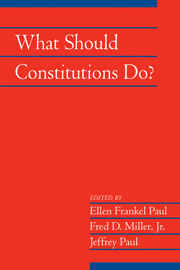Book contents
- Frontmatter
- Contents
- Introduction
- Acknowledgments
- Contributors
- What Are Constitutions, and What Should (and Can) They Do?
- Constitution and Fundamental Law: The Lesson of Classical Athens
- Contract, Covenant, Constitution
- Constitutionalism in the Age of Terror
- The Liberal Constitution and Foreign Affairs
- Do Constitutions Have a Point? Reflections on “Parchment Barriers” and Preambles
- The Origins of an Independent Judiciary in New York, 1621-1777
- Foot Voting, Political Ignorance, and Constitutional Design
- Pluralist Constitutionalism
- Deliberative Democracy and Constitutions
- The Constitution of Nondomination
- Can We Design an Optimal Constitution? Of Structural Ambiguity and Rights Clarity
- Index
Introduction
Published online by Cambridge University Press: 05 June 2012
- Frontmatter
- Contents
- Introduction
- Acknowledgments
- Contributors
- What Are Constitutions, and What Should (and Can) They Do?
- Constitution and Fundamental Law: The Lesson of Classical Athens
- Contract, Covenant, Constitution
- Constitutionalism in the Age of Terror
- The Liberal Constitution and Foreign Affairs
- Do Constitutions Have a Point? Reflections on “Parchment Barriers” and Preambles
- The Origins of an Independent Judiciary in New York, 1621-1777
- Foot Voting, Political Ignorance, and Constitutional Design
- Pluralist Constitutionalism
- Deliberative Democracy and Constitutions
- The Constitution of Nondomination
- Can We Design an Optimal Constitution? Of Structural Ambiguity and Rights Clarity
- Index
Summary
“In framing a government which is to be administered by men over men,” James Madison wrote, “the great difficulty lies in this: you must first enable the government to control the governed; and in the next place oblige it to control itself.” The task of a constitution is to solve this difficulty by setting out the structure of the government and establishing its powers and limits. But how extensive should those powers be, and where should their limits lie? What are the legitimate functions of government, and what is their proper justification? Should a nation's constitution aim at securing the general welfare of its citizens, and, if so, how is the general welfare to be defined? What protections should a constitution afford to individual rights, and how should these rights be specified?
The essays in this volume–written by prominent philosophers, political scientists, and legal scholars–address these questions and explore related issues. Some essays examine the basic purposes of constitutions and their status as fundamental law. Some deal with specific constitutional provisions: they ask, for example, which branches of government should have the authority to conduct foreign policy, or how the judiciary should be organized, or what role a preamble should play in a nation's founding document. Other essays explore questions of constitutional design: they consider the advantages of a federal system of government, or the challenges of designing a constitution for a pluralistic society–or they ask what form of constitution best promotes personal liberty and economic prosperity.
- Type
- Chapter
- Information
- What Should Constitutions Do? , pp. vii - xvPublisher: Cambridge University PressPrint publication year: 2011

